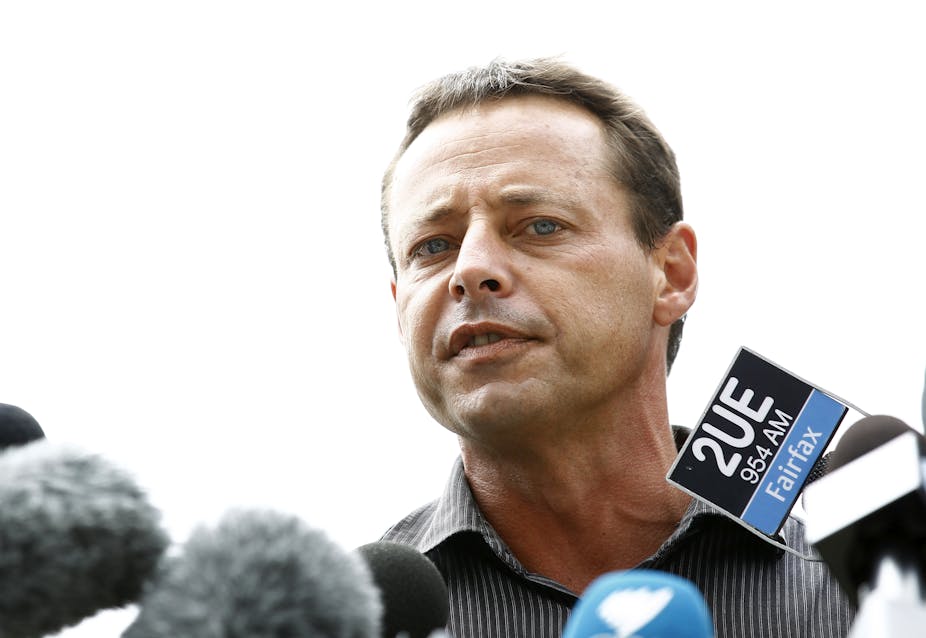A United States Military Court’s decision to overturn David Hicks’ conviction for the crime of “material support for terrorism” represents a welcome return to the international rule of law – at least in the US.
I have written previously that material support for terrorism was effectively a “non-crime” at the time of Hicks’ relevant actions. This was not just according to international lawyers, but also according to the DC Circuit Court of Appeals, the Obama administration and even the military prosecutors.
As a result, it was simply not tenable for the Military Court to maintain Hicks’ conviction. It had already recently overturned a similar conviction in the case of Sudanese detainee Noor Muhammed.
Background
Hicks was captured in 2001 and alleged to have aided the Taliban in Afghanistan against US interests. Several charges were laid, but after a series of legal challenges in and to the Military Commissions, all but the charge for “material support for terrorism” were dropped.
To gain his freedom – he had, by this time, been detained and allegedly mistreated for several years – Hicks eventually entered what is known as an “Alford plea”, a curious legal device which lets the defendant accept punishment without actually confessing guilt. As a result, he was sentenced in March 2007 to seven years’ imprisonment, suspended for all but nine months. After two months, he was transferred to Australia to serve the remainder of his sentence.
In 2012, the DC Appeals Court held – in a separate but related case – the charge to be ill-founded. Although part of Hicks’ plea agreement was that he would not challenge his conviction, Hicks has maintained he only signed the agreement under duress, calling its validity into question.
As such, it was appropriate for Hicks’ legal representatives to lodge an appeal – which they did in mid-2013. It turns out the agreement was invalid on a more prosaic basis anyway.
Consequences for the Australian government
In 2012, Hicks had plans to sue the Australian government. As recently as January 2015, an apology call was on the cards.
However, it now seems that Hicks will not be seeking an official apology. He is merely expressing the hope that he will receive assistance in what he says is:
… becoming an expensive exercise to fix myself from torture.
In explaining why it will not make either concession, the Australian government has consistently argued that Hicks “revelled in jihad” and was “up to no good” in Afghanistan. Attorney-General George Brandis recently added that Hicks’ activities “might now be illegal under Australian law”.
While all of this may be relevant to the question of an apology – a political remedy – it is irrelevant to the question of legal remedies, including compensation.
Under articles 2 and 9 of the International Covenant on Civil and Political Rights (ICCPR), those who are detained arbitrarily or illegally are owed an “effective remedy” – there is no exception for the “undeserving”.
Hicks’ is not an isolated case. The Australian government recently vehemently dismissed a recommendation from the Human Rights Commission, based on article 9, to compensate a man who was wrongfully detained beyond the length of his prison sentence. Former immigration minister Scott Morrison’s comment that the commission “seems to be always arguing for a fair go for those who have forfeited that right [to personal liberty] by their own behaviour” reveals an attitude fundamentally antithetical to the rule of law.
Under international law, everyone has rights simply by virtue of being human. These rights may be limited – or even suspended in case of grave emergency – according to law, but not otherwise. To argue that “bad people” have no rights is not only legally incorrect; it sets a dangerous precedent for arbitrary rule.
In Hicks’ case, we are talking about possible compensation for years of physical and psychological abuse. The mistreatment of detainees at Guantanamo Bay is hardly in dispute any longer. Even the prosecutor who laid the charges against Hicks has openly petitioned for the whole operation to be closed down based on his knowledge of how the detainees are treated.
That Hicks was detained on bogus charges alone entitles him to a remedy. But his mistreatment, which potentially constitutes a breach of both the ICCPR and the UN Convention Against Torture, and its consequences – the need for ongoing medical care – mean that adequate (that is, substantial) compensation is required if the remedy is to be “effective” as defined in international jurisprudence.
If the matter came before an international tribunal, there would likely also be recommendations to “make official inquiries into the circumstances giving rise to the breach”, and to “take measures to prevent similar violations in the future”.
Based on the Abbott government’s stance to date, there seems little chance of an effective remedy being provided – at least not voluntarily. A suit based on domestic law might be Hicks’ only recourse, but he would face substantial jurisdictional hurdles given that most of the potential claims relate to his treatment in another country.
There is some evidence that an ALP government might respond differently. But given the record of both sides of politics in responding to remedial recommendations from the UN Human Rights Committee, it is hard not to be sceptical.

